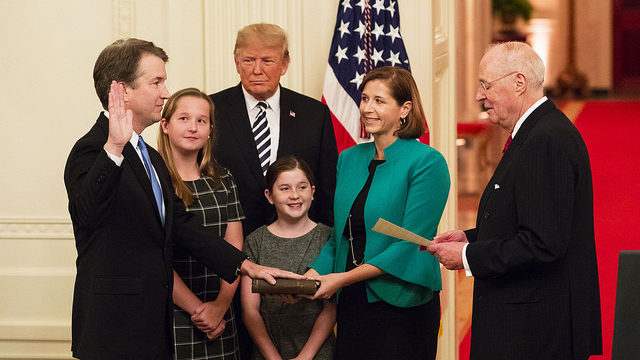This blog post was written by Danielle Castaldi-Micca, Director of Political and Government Affairs from the National Institute for Reproductive Health for our 2018 PowHer The Vote campaign.
The question I get asked most frequently these days is “What is going to happen to Roe v. Wade?”
It’s a good question, and demonstrates the very reasonable fear that the Supreme Court is now poised to roll our reproductive rights back. Roe creates a federal standard that abortion is legal up to 24 weeks, and after that if a woman’s health or life is in danger, or in cases of fetal inviability. It was decided in 1973 and made abortion legal nationwide. If Roe is overturned or gutted by the Supreme Court, the law would not change immediately in most places (except in the four states that have statutory triggers for just this occasion). Unless Congress acted to restrict or ban abortion, this question would be resolved individually by each state.
So what would happen at the state level in New York? To answer that, you need to know what access looks like in our state today.
In 1970, New York legalized abortion, making it the first state in the nation where residents and those who traveled here could access legal care. It was a revolutionary law that saved countless lives—but it is now nearly 50 years old and hopelessly outdated.
New York law regulates abortion within the criminal code, rather than the health code where it belongs. And it fails to meet the standard in Roe, only allowing abortion after 24 weeks when the woman’s life is in danger. This discrepancy has forced pregnant New Yorkers in critical health situations to leave the state for care. How wildly unacceptable. (To learn more visit: https://www.nochoicetravel.com/)
Additionally, in 1970 the legislature did not predict changes to the medical field, unnecessarily limiting the kinds of medical professionals who can provide abortion care—a critical gap given the healthcare deserts in our state. Additionally, it failed to repeal a Civil War-era prohibition on self-managed abortion—meaning that women who terminate a pregnancy without a doctor can face prosecution and jail time.
New Yorkers are already experiencing their post-Roe reality: access for some, but not all. It is not the worst state in the country, but it certainly could be better. That’s why candidates across the state have been committing to vote on the Reproductive Health Act in the first 30 days of the 2019 legislative session. We need to update our laws to ensure greater abortion access for New Yorkers, and those who have to travel to our state to get safe, legal abortion care, just like they did in 1970. Abortion should not be a crime in New York, and no one should face jail for terminating their pregnancy.
Photo Credit: The White House Flickr.


